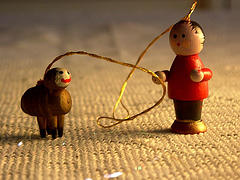In some random coincidence after my last post, I read this piece over at Transpositions on the difference between art and craft. It’s an interesting read, because I think the perception of creativity is all too frequently confined to the “artistic types,” while craftsmen are very under-appreciated.
A year or so ago, Karen and I taught a workshop on creativity as a spiritual exercise. Our launching point was that everyone is creative. As much as our mathematics-obsessed, industrialized culture tries to drill it out of us, we are all creative in some capacity in our daily lives. Or, at least, we have the ability to be. Creativity, after all, isn’t confined to just the passionate painter who begins splashing paint onto the canvas while staring off into the distance and creating a masterpiece, or the novelist who locks herself into a room for weeks on end and forgoes all semblance of a life in devotion the characters she is creating. Those, after all, are stereotypes. I have a friend who is an engineer. He’s a problem-solver on a daily basis…he has to think outside of the proverbial box. Teachers do it, counselors do it, police officers do it. If we don’t do it in some capacity in our vocation, we do it in our avocation. I have friends who are pilots and attorneys who are great musicians in their free time. My father worked with wood. He has a wood shop, and, although he doesn’t make it out there much any more, I remember the intricate creations he would emerge with after being absorbed in his work for hours. I’ve spoken before about my grandmother’s quilts. These are not the things of which we would frequently think when we think of creativity, because they are “crafts” more than “arts.” I think, though, that they necessarily go together.
In theatre, there’s a very technical process to putting together the visual spectacle and story that you see unfold before you as a member of the audience. Sets have to be designed and built, colors chosen, lighting equipment focused and programmed, sound effects designed from scratch and microphones balanced. Costumes are sewn. Make-up is methodically applied. All of these disciplines are very technical in nature, but all must come together to create the artistic medium we know as theatre. The modern children of theatre, film and television, are the same in nature. In fact, even more technical expertise is required for these.
The post from Transpositions that I linked to above was the first of two. In the second, which posted today (and was the reason I waited to publish this post), moves more toward the conclusion. Summarizing the book the bloggers are reviewing, they decide that crafts are created with functionality in mind, whereas art is created with communication in mind.
While art and craft are equally important, I think there’s a danger in equating the two, because the functionality of the craft transforms into utilitarianism in art. When this occurs, beauty is not acceptable on it’s own terms…art suddenly needs a justification to exist, which is a burden of proof that should never be imposed on art. Yet, it is imposed all too frequently (anyone been to a Western Evangelical church, lately?).
I think it’s extremely important that all of us recognize our creative potential, because it’s there in all of us, whether we are artists or craftsmen/craftswomen. What does it take to achieve this today? Slowing down, making space, prioritizing…that would take another post entirely. For now, it’s critical to realize that your creativity is very capable and very much alive inside of you, patiently awaiting release. And, while the quality of the end result must stand on its own, the act of creating never, ever needs justification. Creation is its own justification, an impulse that is central to every human being.
Photo Attribution: Jeff Belmonte
